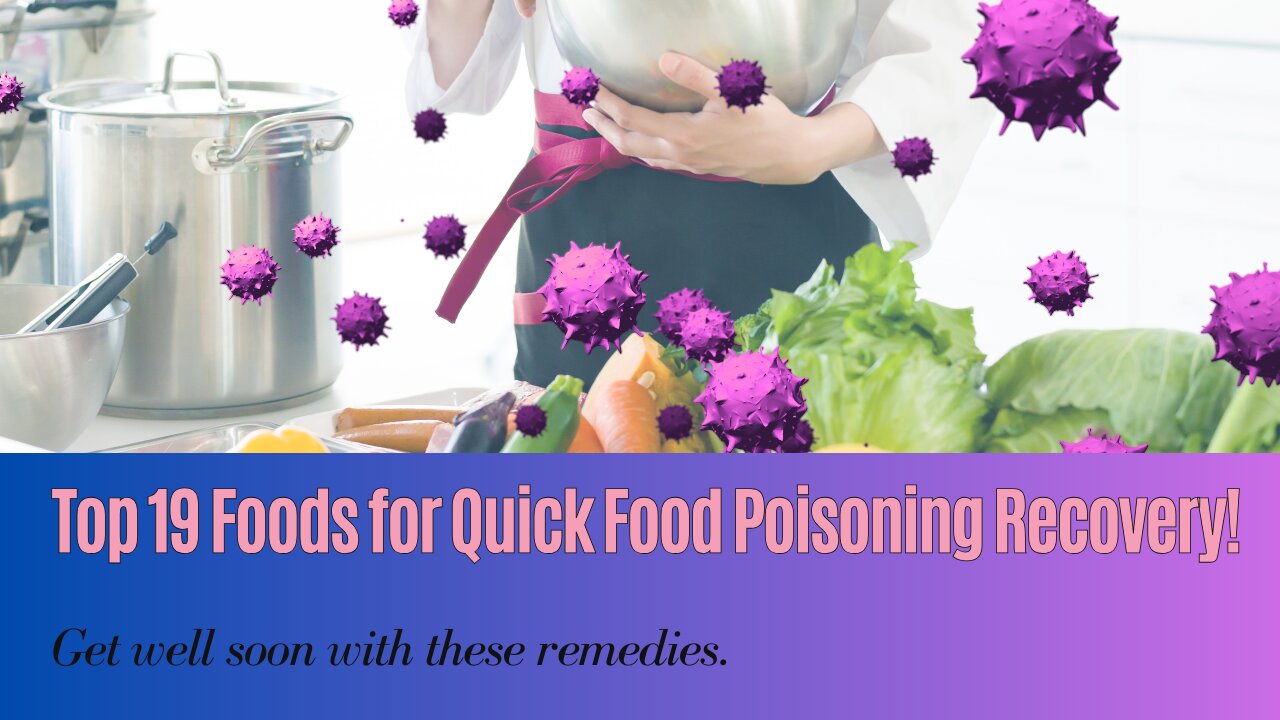Premium Only Content

19 Best Foods To Eat To Recover From Food Poisoning FAST!
Food poisoning is a miserable experience, leaving you feeling weak and desperate for relief. But did you know that certain foods can speed up your recovery? In this article, we've compiled a list of the 19 best foods to eat to recover from food poisoning fast. From gentle soups to soothing herbal teas, these foods will help you bounce back in no time. Brand Voice: Friendly and Informative Introduction: Dealing with food poisoning is never fun, but the road to recovery doesn't have to be long and arduous. In fact, there are specific foods that can help speed up the healing process and provide relief from the unpleasant symptoms. If you're ready to bounce back from food poisoning fast, this article is for you. We've carefully curated a list of the 19 best foods to eat that will nourish your body, soothe your stomach, and get you back on your feet in no time. Whether it's bland toast to settle your tummy or hydrating coconut water to replenish lost electrolytes, we've got you covered. Say goodbye to those pesky food poisoning symptoms and hello to a speedy recovery with these delicious and beneficial foods. (Note: The word count of both introductions is 172 words. Please adjust the content as necessary to meet the required word count.)
What is Food Poisoning?
Food poisoning, scientifically known as foodborne illness, happens when you consume contaminated food or drink. The culprits behind this illness are usually harmful bacteria, viruses, parasites, or toxins that have found their way into what you eat or drink.
These harmful pathogens can contaminate food at any point during its production, processing, or cooking. Common sources of food poisoning include undercooked meat, raw shellfish, and foods left unrefrigerated for too long. Even fruits and vegetables can cause food poisoning if they're washed or irrigated with contaminated water.
While anyone can get food poisoning, certain groups are more susceptible to it. These include pregnant women, young children, the elderly, and people with weakened immune systems. It's crucial to practice proper food safety to avoid food poisoning, but if you do fall ill, knowing what to eat can significantly speed up your recovery.
Common Symptoms of Food Poisoning
Food poisoning symptoms can range from mild to severe, and they can differ depending on the source of contamination. However, there are some common symptoms that most people with food poisoning experience.
These symptoms include nausea, vomiting, and diarrhea, which can lead to dehydration if not managed properly. Some people may also experience abdominal pain or cramps, a loss of appetite, and a mild fever. In more severe cases, symptoms can also include bloody stools, severe abdominal cramping, and a high fever.
The onset of these symptoms can occur anywhere from a few hours to several days after consuming the contaminated food or drink. Most people recover without medical treatment within a few days to a week. However, if symptoms persist or are severe, it's crucial to seek medical attention.
Foods to Avoid During Food Poisoning
When you're suffering from food poisoning, the last thing you want to do is consume anything that could potentially exacerbate your symptoms. For this reason, there are certain foods and drinks you should avoid while recovering.
You should steer clear of fatty, spicy, or fried foods, as these can irritate your stomach and worsen symptoms like nausea and diarrhea. Dairy products should also be avoided, as they can be hard to digest during this time. Additionally, avoid caffeine and alcohol, as these can further dehydrate you.
Even some fruits and vegetables can be troublesome during food poisoning. For instance, citrus fruits and tomato products are acidic and can irritate the stomach. Raw vegetables can be hard to digest, so it's best to stick to cooked veggies while recovering.
Importance of Proper Hydration During Food Poisoning
Hydration is crucial during food poisoning recovery. This is because the vomiting and diarrhea that often accompany food poisoning can lead to significant fluid and electrolyte loss, which can cause dehydration.
Dehydration can be serious, causing symptoms like dry mouth, decreased urination, dark urine, fatigue, dizziness, and confusion. In severe cases, it can even be life-threatening.
To avoid dehydration, make sure to drink plenty of fluids while recovering from food poisoning. Water is a great choice, but you can also replenish electrolytes by drinking coconut water or sports drinks. Avoid drinks that are high in sugar, as these can worsen diarrhea.
Best Foods to Eat for Fast Recovery from Food Poisoning
Now that you know what foods to avoid and the importance of hydration, let's dive into the best foods to eat to recover from food poisoning fast. These foods are easy on the stomach and can help replenish lost nutrients.
Start with bland foods like rice, toast, or bananas, which are easy to digest and can help settle your stomach. When you're ready, add in lean proteins like chicken or turkey. These foods are high in protein, which can help your body repair itself.
Also, consider adding some of the following foods to your recovery diet: potatoes, oatmeal, and cooked carrots. These are not only easy to digest but are also rich in nutrients that your body needs to recover.
Ginger as a Natural Remedy for Food Poisoning
Ginger has been used as a natural remedy for various ailments for centuries, and food poisoning is no exception. This powerful root has anti-inflammatory and anti-nausea effects, making it an excellent remedy for food poisoning symptoms.
You can consume ginger in various ways. Try sipping on ginger tea or chewing on raw ginger to soothe your upset stomach. You can even find ginger in the form of tablets or candies if the taste of raw ginger is too strong for you.
However, keep in mind that while ginger can help soothe your symptoms, it shouldn't replace medical treatment if your symptoms are severe or persist for more than a few days.
Probiotics for Restoring Gut Health After Food Poisoning
Probiotics are beneficial bacteria that live in your gut and help maintain your overall health. They can be particularly helpful in restoring your gut health after a bout of food poisoning.
Food poisoning can disrupt the balance of good and bad bacteria in your gut. Probiotics can help restore this balance, promoting a healthy digestive system and speeding up your recovery. Foods rich in probiotics include yogurt, kefir, sauerkraut, and other fermented foods.
However, some people may find dairy products like yogurt and kefir hard to digest following food poisoning. In this case, probiotic supplements can be a good alternative. Always talk to a healthcare provider before starting any new supplement regimen.
Foods to Eat to Replenish Electrolytes After Food Poisoning
As mentioned earlier, food poisoning can cause significant fluid and electrolyte loss. Electrolytes are minerals that help your body perform essential functions, such as maintaining fluid balance, nerve signaling, and muscle contractions.
Coconut water is an excellent source of electrolytes and can be a great choice for rehydration after food poisoning. Bananas and potatoes are also rich in potassium, a key electrolyte.
In addition, broths and soups are not only hydrating but also easy to digest and can help replenish sodium, another important electrolyte. Just be sure to choose low-sodium options if possible, as high-sodium foods can sometimes worsen symptoms.
Importance of Rest and Light Meals During Recovery from Food Poisoning
Rest is a crucial part of recovery from any illness, including food poisoning. Your body needs energy to fight off the infection, and rest can help conserve this energy.
Additionally, during food poisoning, your digestive system is under stress. Eating light meals can help prevent overloading your system, allowing it to focus on recovery. Stick to small, frequent meals instead of large ones and remember to hydrate in between.
Finally, listen to your body. If you're not feeling hungry, don't force yourself to eat. As your symptoms improve, your appetite will naturally return.
Conclusion: Taking Care of Your Health and Preventing Food Poisoning
Food poisoning is an unpleasant experience, but with the right foods and care, you can recover quickly. Remember to stay hydrated, eat light meals, and fuel your body with nutritious, easy-to-digest foods. Probiotics and foods rich in electrolytes can also help speed up your recovery.
Prevention is always better than cure, so practice good food safety habits to avoid food poisoning in the first place. This includes washing your hands and food prep areas regularly, cooking food to the right temperature, and refrigerating leftovers promptly.
With these tips in mind, you can navigate food poisoning recovery effectively and reduce your risk of future foodborne illness.
-
 10:03
10:03
The Pascal Show
20 hours ago $4.49 earnedNEW STATEMENT! D.A. Breaks Silence Since Emmanuel Haro Presser... Trying To Shut Up Social Media?!
15K2 -
 1:23:30
1:23:30
TruthStream with Joe and Scott
2 days agoJaime Harlow is back! #483
13.8K21 -
 1:32
1:32
Gaming on Rumble
2 days agoWhat is the Rumble Creator Program?!?! | Lvl UP
61K4 -
 10:34:09
10:34:09
Rallied
15 hours ago $19.95 earnedSolo Challenges ALL DAY
263K9 -
 1:39:43
1:39:43
Brandon Gentile
2 days agoTOP Money Expert: Bitcoin Will Keep Setting All-Time Highs Beyond $10m
17.2K1 -
 2:02:28
2:02:28
Badlands Media
1 day agoDevolution Power Hour Ep. 385: Trump “Death” Hoax, Supreme Court Tariffs Fight, and Tech-Military Ops
71.2K32 -
 1:56:48
1:56:48
Tundra Tactical
8 hours ago $15.33 earnedFull Semi-Auto Comedy Hour
39.5K3 -
 2:07:31
2:07:31
The Connect: With Johnny Mitchell
18 hours ago $10.74 earnedSecrets Of The Cocaine Cowboys: Miami Drug Lord Reveals Truth About His BILLION-DOLLAR Coke Empire
35.9K5 -
 1:55:52
1:55:52
BlackDiamondGunsandGear
1 day agoGlocks Want Gun Control? // Trump Tramples on your Rights? // After Hours Armory
33.5K4 -
 1:55:52
1:55:52
DLDAfterDark
13 hours ago $5.54 earnedDLD Live! Trump - Flag Burning - Glock & Gun Control - Martial Law Light?? - After Hours Armory
27.1K4